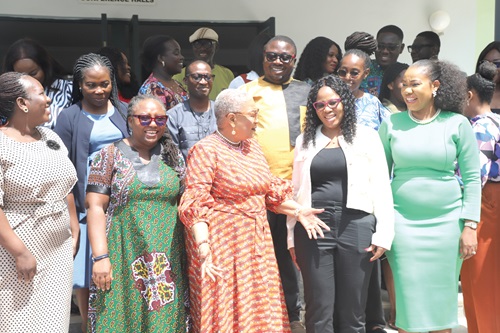The Executive Director of Salt and Light Ministries, Dr Joyce Aryee, has called for the need to strengthen legal and policy frameworks to advance gender equity in the country’s extractive sector.
Speaking at a policy conference in Accra, she acknowledged that the country had made significant strides in extractive governance through the establishment of key legal instruments such as the Minerals Commission Act, the Petroleum Commission Act, and the Minerals Development Fund Act.
Dr Aryee, however, said that despite frequent references to gender equality in policy documents, many of these policies lacked specific, measurable targets and robust enforcement mechanisms.
“For instance, the Petroleum Commission Act calls for at least one woman on its board.
Similarly, the Minerals Development Fund Act includes provisions for women's representation on local management committees.
These are commendable steps but they remain incremental and fall short of the systemic changes needed to truly transform gender dynamics,” she said.
Dr Aryee, therefore, stresed the need to adopt SMART goals (Specific,Measurable, Achievable, Relevant, Time-bound) to ensure the meaningful inclusion of women in decision-making processes.
Conference
The two-day conference, part of the Power Voices Project, was organised by the Network for Women’s Rights in Ghana (NETRIGHT) in collaboration with Third World Network-Africa (TWNAfrica), on the theme: “Transforming Ghana’s Extractive Sector for Gender Justice and Inclusive Growth.”
The event was aimed at creating a platform for dialogue to influence policy reforms that promote equal opportunities for women and marginalised groups in the extractive sector.
Invest
Dr Aryee also stressed the need to invest in women’s empowerment, saying, “We need targeted investments to expand access to STEM, technical and vocational education and training for women, improve access to capital and financial services for women entrepreneurs, and support women’s cooperatives and small-scale mining initiatives.”
Additionally, she emphasised the importance of promoting gender-responsive public services.
She said communities affected by extractive projects must have access to gender-sensitive health care, quality education and comprehensive social protection programmes.
These services, she said, were vital to empowering women economically.
Review
The Deputy Director of Ghana Geological Survey Authority, Keren-Happuch Osekre, stressed the need to review the national mining policies to integrate gender perspectives.
She said the mining sector had long been dominated by men, and as such the contributions of women had often been undervalued or completely ignored.
Ms Osekre emphasised that while women had increasingly entered roles such as engineers, environmental monitors, traders and community liaisons, many were still confined to the informal sector, where they occupied the lowest-paying and most hazardous jobs.
Citing statistics, she revealed that less than 15 per cent of formal employees in the country’s mining sector were women as compared to the over 51 per cent of the national population.
She said in the Artisanal and Small-Scale Mining (ASM) sector, women accounted for 30–50 per cent of the workforce, yet their access to resources such as capital, equipment, and land remained severely limited.
Ms Osekre said ,”The Labour Act promises equal pay for equal work, but the lived reality in mining says otherwise. Women are still paid less, overlooked for promotions and subjected to cultural and structural obstacles.”
She advocated a higher percentage of women's representation in community committees and decision-making bodies in the mining sector.
The Deputy Director encouraged young women to consider the extractive sector as a career opportunity and provide women with mentorship and capacity-building support.
Relevance
The Programme Manager, NETRIGHT, Cynthia Sunu ,called for a deliberate integration of gender sensitivity into the country’s extractive sector policies, emphasising that women must no longer be sidelined in the country’s transformation agenda.
She underscored the importance of gender considerations in the broader conversation on structural economic transformation and development.
She further stressed the role of civil society organisations and gender justice advocates in influencing extractive sector policy through meaningful engagement.

